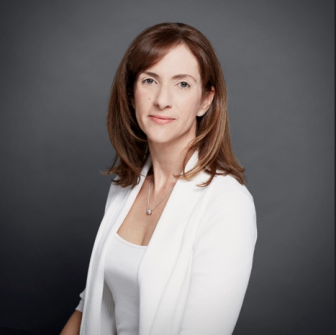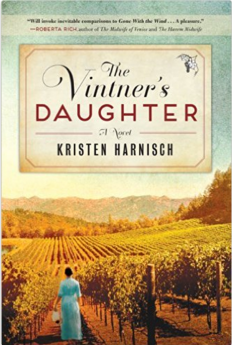Kristen Harnisch got the idea for her novel, “The Vintner’s Daughter” on a trip to the Loire Valley in France, just after she and her husband moved to Darien.

Kristen Harnisch, author of “The Vintner’s Daughter”
“I had one of those moments when I was standing on the edge of a Vouvray [a village] vineyard where I just got the goosebumps because it was one of the most beautiful things I’d ever seen,” Harnisch recalled when speaking at the Darien Library annual meeting on Oct. 17. “I just started thinking to myself, ‘You know, this would be the perfect setting for the novel that I’d always secretly wanted to write.'”
So she did. Although it wasn’t simple or easy or quick. She spent more than a dozen years from research to learning how to write fiction, to writing, rewriting and rewriting and rewriting, then, when she found a publisher who agreed to print it up, working with the editor.
Here’s how Harnisch did it, in her own words, excerpted from the featured talk at the library’s annual meeting (this is Part 1 — about writing the novel; in Part 2 she’ll describe how she got it published and what happened then):
[First step: research, then and there on her trip]
So I started asking questions of the vintners and the winemakers. I wanted to know who were those families who for generations had made those wines […] and how did they choose the grapes that they grew and the wines that they made and what kind of challenges did they face? […] Luckily my father [who was on the trip with her] speaks fluent French, and so he started asking for me. […]
I thought it would be wonderful to have a character who made that transition from France […] to California, struggling to reclaim her family’s 19th century Loire Valley vineyard. [She had lived in California and knew a lot of people who’s families had immigrated there to grow grapes or make wine.]
I had all these questions about California winemaking. […] I headed over to Darien Library, and this is where it all started for me. […] I’d leave my husband with three kids on the weekend, [he’d say] “Don’t worry, honey, I got this. Go chase that dream — but please hurry back!”
I would book one of the little study rooms or sit in one of the larger rooms. I could not have written my novel without the Darien Library and the wonderful librarians here.

Harnisch was the main speaker at the annual meeting of Friends of Darien Library. (Photo from Darien Library’s Twitter account)
Doing something creative outside our comfort zones, we all have moments of just incredible self doubt, where you’re like, “What am I doing? What am I thinking? I can’t write a novel. What? I’m a banker. I’m a stay-at-home mom. What, what am I thinking?”
Whenever I was thinking that or got writer’s block, I would walk the stacks, and I would walk through the library — nonfiction, fiction, cookbooks — it didn’t matter — I would pull titles from the shelf, I would flip through and I would think to myself, ‘If all these people wreote a book, whyt the heck can’t I?’ That’s really what I would do, and that would give me the little boost of confidence that I needed. […]
One of the things you don’t realize when you’re writing, especially historical fiction, is how nitty-gritty you have to get. I mean, you have to know what undergarments these people are wearing, even if you don’t use it in the novel. You need to know these things — what they’re eating, what they’re drinking, what the medical care was.”
[She did some of her research on a trip visiting vineyards in California.] “Your goal is really to have the reader transported through the sights and the smells and everything that you bring to them in your descriptions in the book, and you really want them to feel like they’re there.
[She found out that every bottle of wine contains about three pounds of grapes; that wine growers have to surmount challenges from pests, frost, mold and mildew to raise a crop; then they have to worry about the market.]
 It’s very inspiring and humbling when I did this research to understand everything that they went through, and in a way, it’s a metaphor for novel writing. It’s an exercise in passion and persistence. It really, really is, and so I applaud them for their efforts. I didn’t expect to have that experience when I was researching the book, but it was one of the little joys that I had. […]
It’s very inspiring and humbling when I did this research to understand everything that they went through, and in a way, it’s a metaphor for novel writing. It’s an exercise in passion and persistence. It really, really is, and so I applaud them for their efforts. I didn’t expect to have that experience when I was researching the book, but it was one of the little joys that I had. […]
I also had to know how to write. I knew how to write a really mean marketing memo from my banking days [before she became a mother, Harnisch had a career in banking], so I could write those till the cows come home, but to really write a piece of fiction that could keep the reader riveted was something that I was not accustomed to and I didn’t know how to do.
So I took a lot of online writing classes through the Gotham Writers Workshop in New York City, and that was great, because people would critique my work, I would critique theres, and you kind of got a feeling for whether or not your writing is quality or how you need to change it. And, of course, I took out a lot of books from this library on novel writing.
[She made about 10 revisions of the book, and family members read it, and then a “beta reader” read through it to make more suggestions.] You fix the book, you revise the book. So after 10 revisions, I sent it to a literary agent. And then I sent it to another literary agent. [And to more agents.] They all rejected it.
That was the first year.
It was funny, the comments you get. Some agents said, “Oh, it’s too literary.” Others said, “It’s too commercial.” One actually said, “There’s just a little too much wine making.” […]
My favorite was the one who said to me, “You know, I just love the writing and the story. It’s wonderful! I just don’t know how I’m going to market it.” It’s about women. And wine. Really? Is it that much of a stretch? Come on!
It’s just like marriage — you have to pick the right person [to be your agent]. You have to know what you’re looking for and they have to know what they’re looking for, and that’s when it comes together.
________
- Did you know it’s National Novel Writing Month?
- Here are Darien Library’s “Resources to Help You Write Your Novel“
- The library is hosting its next “Write In Event” on Sunday, Nov. 29.
________
So, basically, I just decided it would be published — I didn’t know where — and I’d just keep going.
Then all of a sudden one of my author friends connected me with one of her friends who was an agent and happened to be looking for book-club fiction […] and — wouldn’t you know it — lives in Sonoma and she vacations in France, so it’s all good, it all worked out. […]
Within three months of signing with her, we had a two-book deal with Harper Collins Canada. That was my Tom-Cruise-jumping-on-Oprah’s-couch moment! […] I was so excited!
Answers to questions from the audience
[How much of your first draft survives in what was published?]
That’s a really good question — not much! […] A lot of the settings that I described, stayed; but a lot of the dialogue [didn’t].
***
You get to a point when you’re writing [when] you don’t have enough fire. There’s not enough going on to keep me sustained or the reader sustained, and it’s what they call the “muddle in the middle.”
One of the best cures for the muddle in the middle is really to throw your character in more distress and then see what happens — like, give them another big problem. So what I found myself doing more than anything was creating more hurdles for my character.
How Darien librarians helped her research
[Harnish also spoke about how grateful she was for the help she received from librarians in Darien. Here’s part of an earlier article on the library’s annual meeting in which she spoke about that:]
“I literally wrote the book in this library — the old location and the new location,” Harnisch said.
It took her 14 years to write the historical novel and get it published, said the stay-at-home mom, and she had the help of her husband, friends and relatives and the library staff, she said.
She used the library’s books for research, along with librarians “with a smile on their faces and such an eagerness, a willingness to help me with my research.” She also ordered about 100 books from other libraries in Connecticut and beyond through the library to help with research.
At one point, she asked a librarian to help her get an English-language version of the Napoleonic Code as it existed in the late 19th century, “and she’s like ‘I got this,’” Harnisch said. The librarian got it online. “It wasn’t even 10 minutes later.”
“This is why they’re in the acknowledgments of the book,” Harnisch said. “No question is too obscure for them. I guarantee you — test them!” she said, and as the audience laughed, she added, “It’s true! It’s true!”
Next: Part 2 — adventures in getting published.
Editor’s note: We couldn’t find a video of the annual meeting or Harnisch’s talk during it online, but we did find a 41-minute video of Harnisch at the library almost a year before, in October 2014. Here it is.


Shout out to Kristen! She has worked incredibly hard for her success! – Leslie Yager / GFP